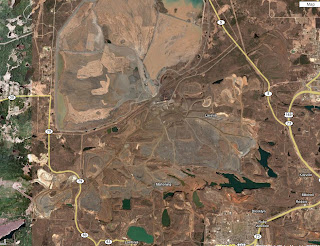I've had a post bouncing around my head for a while. It's about saving the human world. (The rest of the world will do just fine - eventually. As my 8 yo says, history just keeps happening.)
I'm going to write that post - eventually. I'll try to write the main risks down (US-China conflicts, WMDs, cost of havoc, rapid environmental collapse and resulting socioeconomic disruptions, artificial minds [1], etc) and what a geek can do about them in the age of O'Reilly.
In the meantime, a post by Scott Aaronson (yes, two t, two a)...
Shtetl-Optimized » Blog Archive » Procrastinating on the sidelines of history
... So, Al Gore. Look, I don’t think it reflects any credit on him to have joined such distinguished pacifists as Henry Kissinger and Yasser Arafat. I think it reflects credit on the prize itself. This is one of the most inspired choices a Nobel Peace Prize committee ever made, even though ironically it has nothing directly to do with peace.
With the release of An Inconvenient Truth and The Assault on Reason, it’s become increasingly apparent that Gore is the tragic hero of our age: a Lisa among Cletuses, a Jeffersonian rationalist in the age of Coulter and O’Reilly. If I haven’t said so more often on this blog, it’s simply because the mention of Gore brings up such painful memories for me.
In the weeks leading up to the 2000 US election, I could almost feel the multiverse splitting into two branches of roughly equal amplitude that would never again interact. In both branches, our civilization would continue racing into an abyss, the difference being that in one branch we’d be tapping the brakes while in the other we’d be slamming the accelerator. I knew that the election would come down to Florida and one or two other swing states, that the margin in those states would be razor-thin (of course no one could’ve predicted how thin), and that, in contrast to every other election I’d lived through, in this one every horseshoe and butterfly would make a difference. I knew that if Bush got in, I’d carry a burden of guilt the rest of my life for not having done more to prevent it.
The question was, what could a 19-year-old grad student at Berkeley do with that knowledge? How could I round up tens of thousands of extra Gore votes, and thereby seize what might be my only chance in life to change the course of history? I quickly ruled out trying to convince Bush voters, assuming them beyond persuasion. (I later found out I was wrong, when I met people who’d voted for Bush in 2000 but said they now regretted their decision. To me, it was as if they’d just noticed the blueness of the sky.)...
...In the end, though, the Nadertrading movement simply failed to reach enough of its target audience. The websites put up by me and others apparently induced at least 1,400 Nader supporters in Florida to vote for Gore — but 97,000 Floridians still voted for Nader. And as we know, Bush ended up “winning” the state by 537 votes...
Ah yes. Nader. There are no words.
But. We're not alone. Not completely.
[1] Even I wince when I write that. It's just so geeky. Tough.


